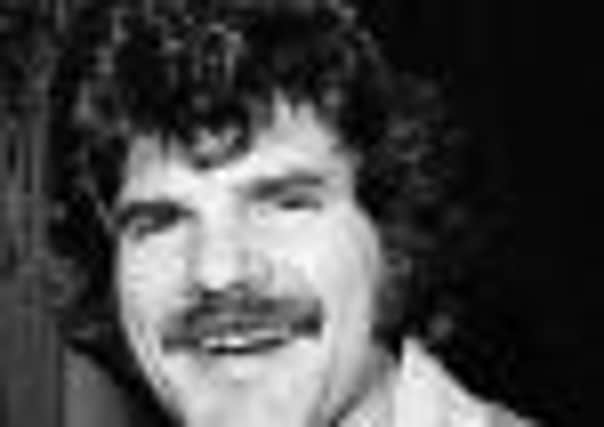Obituary: Don DeVito, record producer


DON DeVito helped revive Bob Dylan’s somewhat stagnant musical inspiration in the early 1970s by producing or co-producing what would become some of the singer’s classic albums, notably Blood on the Tracks (1975), Desire (1976) and Street Legal (1978). Blood on the Tracks, including the songs Tangled up in Blue, Simple Twist of Fate and Shelter from the Storm, silenced those critics who had dared to question Dylan’s genius. To this day, it is often listed among the greatest albums of all time.
DeVito helped persuade Dylan to return to Columbia Records in 1974, where he had launched his career more than a decade earlier, after a two-album excursion to David Geffen’s Asylum Records. In 1974, the singer was still trying to get out of the musical doldrums while a new generation of songwriters such as Kris Kristofferson and Jackson Browne were breaking new ground.
Advertisement
Hide AdAdvertisement
Hide AdDylan was also struggling to cast off his 1960s image as something of a messiah and regain respect purely as a poet and musician. At the same time, his marriage to Sara, which he had managed to keep relatively private despite his fame, was breaking up.
When he showed up at the A&R studios in New York City on 16 September 1974, Dylan had his songs for Blood on the Tracks pretty much ready. All he needed were a few extra session musicians, and a “feel” to pull the record together as an entity. That’s where DeVito and engineer Phil Ramone came in. Although Dylan was essentially his own producer, DeVito did what all good producers do – he was a mentor, a critic, a musician, a sound engineer, a mixer and a re-mixer. Out came Blood on the Tracks, on 17 January 1975, with its stylised grey-and-maroon profile of Dylan on the cover, and the singer was back on top, setting a new benchmark for confessional songs of love, heartbreak, bitterness and outright rage.
The track Tangled up in Blue, a multi-dimensional poem – which the singer saw more as a kind of painting that defied fixed notions of time and space – became a hit single and one of the most requested numbers at Dylan concerts. Not that the great man ever does what’s requested. One writer called the song “a five-and-a-half minute musical Proust” while Dylan himself once said of the song: “You’ve got yesterday, today and tomorrow all in the same room, and there’s very little you can’t imagine not happening.”
He achieved the same effect with the track Simple Twist of Fate – “He hears the ticking of the clocks, and walks along with a parrot that talks, hunts her down by the waterfront docks where the sailors all come in ….” (Not content with the recordings laid down in New York over four days, Dylan later re-recorded half the album in Minneapolis with new musicians).
From Dylan’s earlier days at Columbia Records, DeVito knew Dylan didn’t do rehearsals, and did few takes. DeVito recalled that the session musicians had to watch the singer’s hands to figure out what key he was playing in. “To stay in the groove, you’ve got to watch his feet,” DeVito advised them.
Don DeVito was born in Brooklyn, New York, in 1939, a few days after the outbreak of the Second World War. A guitarist himself, he began his musical career with a band headed by Al Kooper, who would later form Blood, Sweat & Tears and play the famous organ riff on Dylan’s Like a Rolling Stone. After getting a college degree in English, DeVito formed his own band, the Sabres. In 1967, he began training as an executive at Columbia Records and would eventually meet Dylan through their mutual friend Johnny Cash.
After persuading Dylan to return to the Columbia “family” from Asylum records, and helping make Blood on the Tracks a success, DeVito played a more hands-on production role on the singer’s next two albums, Desire and Street Legal, both also considered classics by Dylanologists. Desire, which reached number one in the US album charts, opened with the track Hurricane, in which Dylan protested the murder conviction of former middleweight boxer Rubin “Hurricane” Carter. The publicity from the song helped lead to a judge freeing Carter in 1985.
Although he wasn’t entirely happy with the production on Desire, Dylan stuck with DeVito again for the Street Legal album, including the track Is Your Love in Vain? After some criticism of that album, DeVito would eventually remix it almost 20 years later.
Advertisement
Hide AdAdvertisement
Hide AdDeVito would later work with other musicians, including Billy Joel, Bruce Springsteen, James Taylor, Aerosmith, Simon and Garfunkel, Carole King and Tony Bennett. Nominated five times, he eventually won a Grammy in 1989 for the album: Folkways – A Vision Shared: A Tribute to Woody Guthrie & Leadbelly. He was also instrumental in promoting The Concert for New York City after the 9/11 attacks.
Don DeVito, who died after suffering from prostate cancer for many years, is survived by his wife Carolyn and children Marissa and James.
PHIL DAVISON